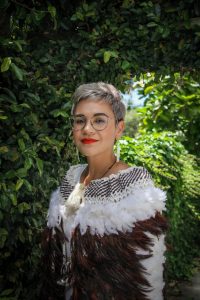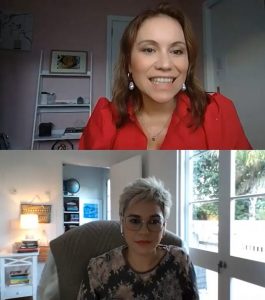Kōrero with Emma Espiner: your liberation is bound up with mine – let us work together
Finally! After months of postponement due to the pandemic, we got to hear commentator Dr Emma Espiner speak to her good friend Stacey Morrison on International Women’s Day, March 8, via video link. And it was a wide-ranging kōrero worth waiting for.
Emma on…
| Colonisation: | “The colonising force was a patriarchal society… So, colonisation happened to Māori women in two different ways: loss of home and whenua, but also the loss of that balance between men and women and our roles in society. And all of the health consequences for Māori women – because we fare the worst, we’re right at the bottom of [all the health statistics] – stems from that.” |
Emma spoke about what it meant, when she was growing up, to spend a lot of time with her mother Colleen Smith at the Lower Hutt Women’s Centre: “It was cool to see the transformative things women can do to help each other.” She described the woman-only space as making people feel safe and protected (a woman’s refuge was co-sited with the Centre, so Emma got some insight into the effects of gender violence and “lessons in how difficult life was for other women”). And, like the public library (“also important to me”), the Centre was separate from work and home – Emma described such welcoming spaces as “critical to society”. A quote from an Indigenous Australian rights group (including Lilla Watson) adorned the Centre wall: ” If you have come here to help me, you are wasting your time. But if you have come because your liberation is bound up with mine, then let us work together.” The idea had a profound effect on Emma: “As a driving value or kaupapa for my life, that would be it.”

Dr. Emma Espiner
Emma on…
| Community knowledge: | “Our communities actually have a lot of the [health] solutions themselves – and they’re never given the respect or the resourcing to implement them. That is consistent across everything.” |
| Health organisations saying certain communities are “hard to reach”: | “That sounds like a ‘you’ problem. Our communities know where they are“. |
| The welfare system: | “I don’t know why we punish people with the welfare system, we make it so difficult and if people have to spend all their energy trying to access what they have a right to, how are they supposed to lift themselves up?” |
Both Emma and Stacey talked about explaining Māori approaches to non-Māori as one important and challenging way of working towards Māori rights. “You do have to bring [non-Māori] people with you,” said Emma. “If you overlook that … then you’re destined to fail because we are a minority and we do need the support of others.” But at the same time, Emma worries about being seen as “‘the friendly Māori’, the compliant one that people can talk to: ‘oh, you’re not like those angry Mah-rees always having a go at us.’ What [they] don’t realise is that we’re all part of the same thing.”

Stacey Morrison (top) and Emma Espiner (bottom) in action!
Emma on…
| The pandemic: | “The biggest casualty of Covid and lockdown has been our loss of connection to each other and we’ll be feeling that for a long time.” Nurses “are out with Covid but also with caring responsibility with children, tamariki, at home who are sick. So, this pandemic has really exposed all the gaps in our health system but also in our society and what we value and what we don’t.” |
| Enabling health equity: | “We need our expert communicators to explain again why this is not about prioritising Māori but [about] correcting the harm that we’ve done by prioritising Pākehā. So, it’s not about not giving Pākehā gold standard care but just making sure everyone gets that as well.” |
| The Māori Health Authority: | “It needs to have hard conversations and make politically risky decisions. We have described the problems from every imaginable angle, interpretation with every angle, nuance. So, there’s no lack of research or moral justification for change. But we still have inaction in the face of need because it’s too hard politically for people to make truly equitable decisions because they’re frightened about losing their positions, because of accusations of racial bias and privilege – that train is never late when you try to act on equity. We need… courage first.” |
Currently a junior doctor at Middlemore Hospital, Emma talked a lot about her respect for her colleagues who go above and beyond their professional qualifications, who are willing to navigate the system in order to increase equitable healthcare. “We work with some amazing pharmacists who know where the free pharmacies are… occupational therapists who know the equipment people need and will sort out all the stuff with ACC to make sure it’s paid for, and really wraparound care for our community.”
As for Emma’s own work, she said being a junior doctor can be “pretty unrewarding… your first 3-6 months really sucks. You don’t know what you’re doing, you’re terrified” so there’s constant anxiety. But a senior colleague had some interesting advice: in that “weird vortex of time” when you’re on the night shift, “it’s quite nice just to go and see someone, [a patient] and have that human connection,” said Emma. And after her kōrero with us, off she went immediately to the night shift at the height of the Omicron wave, buoyed up by the conversation. “I feel very loved,” she said at the end. “My favourite thing!”
